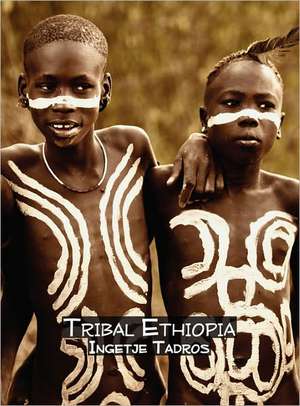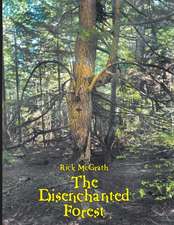Tribal Ethiopia
Autor Ingetje Tadrosen Limba Engleză Hardback – 21 mar 2011
| Toate formatele și edițiile | Preț | Express |
|---|---|---|
| Paperback (1) | 448.30 lei 6-8 săpt. | |
| Ingetje Tadros – 26 feb 2017 | 448.30 lei 6-8 săpt. | |
| Hardback (1) | 543.93 lei 6-8 săpt. | |
| Ingetje Tadros – 21 mar 2011 | 543.93 lei 6-8 săpt. |
Preț: 543.93 lei
Preț vechi: 591.23 lei
-8% Nou
Puncte Express: 816
Preț estimativ în valută:
104.11€ • 108.28$ • 87.24£
104.11€ • 108.28$ • 87.24£
Carte tipărită la comandă
Livrare economică 14-28 martie
Preluare comenzi: 021 569.72.76
Specificații
ISBN-13: 9780987084118
ISBN-10: 0987084119
Pagini: 364
Dimensiuni: 224 x 284 x 33 mm
Greutate: 1.43 kg
Editura: Ingetje Tadros
ISBN-10: 0987084119
Pagini: 364
Dimensiuni: 224 x 284 x 33 mm
Greutate: 1.43 kg
Editura: Ingetje Tadros
Descriere
Dutch photographer Tadros shares 286 pictures that reveal the truth of tribal Ethiopia. A portion of sales of the book will be donated to Survival, the Movement for Tribal People.
Notă biografică
Ingetje Tadros occupies a unique place in the world of social documentary photography, capturing the triumphs, tragedy and diversity of people's lives through her intuitive storytelling. With a passion deeply rooted in humanitarian causes, her photography is often confronting and provocative to evoke a powerful message, telling people's stories firstly at a community level and then to provide a conduit for communication between different cultures on a global platform. Born in Holland, in her formative years Ingetje was always documenting the life of people around her, ultimately combining her passion for photography and travel to where her work now takes her around the globe. When not travelling, she calls Broome her home on the vast and wildly beautiful West Coast of Australia. Her creative vision has been the driver to authoring several documentary projects as diverse as Mental Health in Bali, Leprosy in India, Trans-sexuality in Asia and Death Rituals in Egypt. Ingetje's recent documentation of Kennedy Hill and her ongoing and important work This Is My Country involves documenting the complexities of race and culture of Australia's indigenous people - the Aboriginals. She works regularly on assignment for some of the world's best known online and print magazines. Her clients have included STERN, Amnesty International, Fairfax Media, Sydney Morning Herald, Australian Geographic, The Australian, The Internationalist, News Corp, Getty Images, Daily Mail, DOC Magazine and many more. Recent publications include This is My Country in STERN (2016), Kennedy Hill (Fairfax Media 2015), Caged Humans in Bali (Daily Mail 2014) Ingetje's work has been recognised by a number of photography's most prestigious honours. These include: Winner ANI-PixPalace Award 2016, Winner Walkley Award 2015 (the Australian equivalent of the Pulitzer Prize), Finalist FotoEvidence Book Award 2016, Winner Amnesty International Media Awards 2015, Winner Best Feature Photographic Essay at the 2015 West Australian Media Awards, Finalist in the United Nations Association of Australia Media Peace Awards 2015, Digital display at The Louvre in Paris 2015, Winner 'Best Photojournalism Award' United Nations (UNAA) Media Awards 2014, LensCulture Visual Story Telling Award 2014, The Juliet Margaret Cameron Award for Women 2013 (UK) Finalist FotoEvidence Book Award 2016 with the publication of This is My Country, (This Is My Country looks at people standing on the precipice of life: disenfranchised, neglected and now threatened with displacement. It is a permanent record intended to bring attention to the plight of Aboriginal communities under threat. It will serve as a call to Australian society to support their First People and end the displacement of their communities.)













